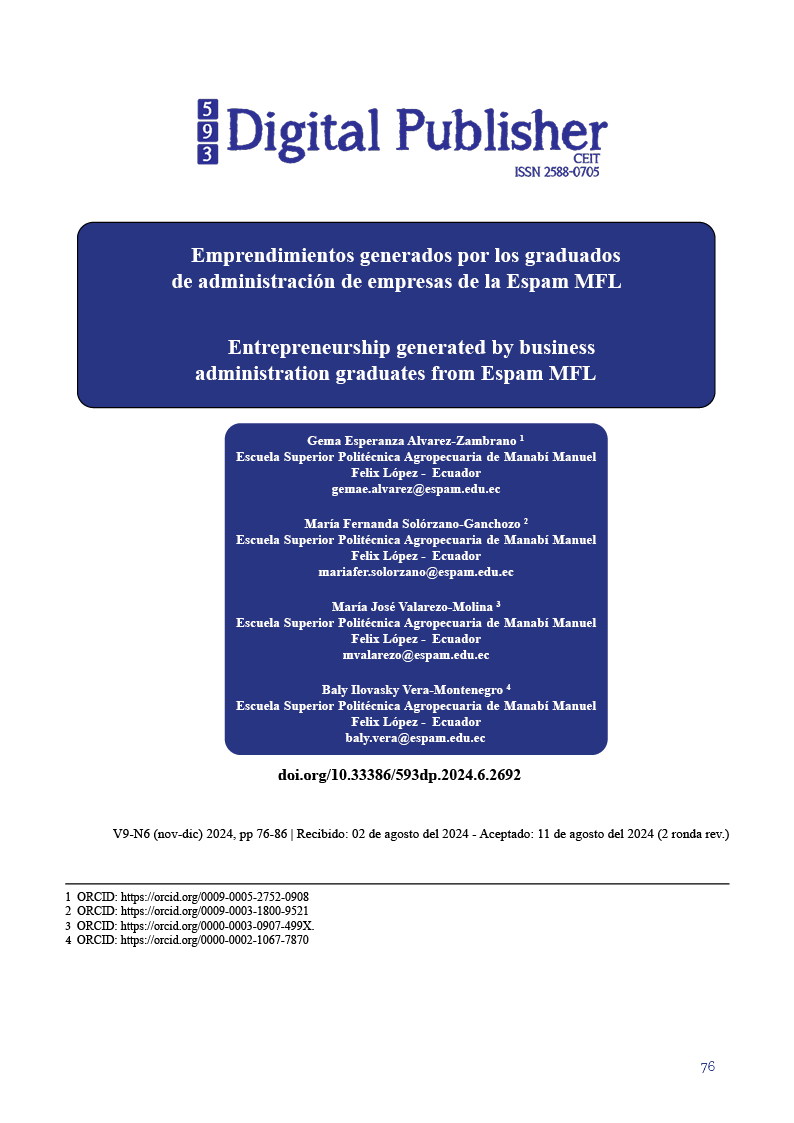Entrepreneurship generated by business administration graduates from Espam MFL
Main Article Content
Abstract
The research explores a diagnosis of the ventures generated by graduates of the 2019-2023 period. Therefore, with the objective of analyzing this phenomenon, the socioeconomic factors that influence graduates when starting a business are identified. The study has a mixed approach that contributed to identifying general patterns and understanding underlying factors influencing entrepreneurial initiative. Additionally, scientific methods were used to ensure the rigor and validity of the results, including inductive, deductive, and synthetic analytical methods to structure the process logically and coherently. Based on the information generated by the survey, a solid database was created and later processed in SPSS. The findings indicated that the rate of ventures started is not very significant, showing that their success depends on endogenous and exogenous factors such as access to capital or subjective norms. In fact, some graduates seek independence and higher incomes; however, others are driven by the need to overcome the lack of job opportunities in the traditional market. To this end, it is important to strengthen the development of entrepreneurial skills by promoting entrepreneurial initiative among graduates.
Downloads
Article Details

This work is licensed under a Creative Commons Attribution-NonCommercial-ShareAlike 4.0 International License.
1. Derechos de autor
Las obras que se publican en 593 Digital Publisher CEIT están sujetas a los siguientes términos:
1.1. 593 Digital Publisher CEIT, conserva los derechos patrimoniales (copyright) de las obras publicadas, favorece y permite la reutilización de las mismas bajo la licencia Licencia Creative Commons 4.0 de Reconocimiento-NoComercial-CompartirIgual 4.0, por lo cual se pueden copiar, usar, difundir, transmitir y exponer públicamente, siempre que:
1.1.a. Se cite la autoría y fuente original de su publicación (revista, editorial, URL).
1.1.b. No se usen para fines comerciales u onerosos.
1.1.c. Se mencione la existencia y especificaciones de esta licencia de uso.
References
Al.badi, Y., Al.Alwi, R., y Khan, F. (2021). Unravelling the Conundrum: Are Entrepreneurship Education and Personality Traits influential for Entrepreneurial Intentions in University. International Journal of Research in Entrepreneurship y Business Studies , 2. doi:https://doi.org/10.47259/ijrebs.243
Acosta, S. (2023). Los enfoques de investigación en las Ciencias Sociales. Revista Latinoamericana Ogmios, 3(8), 82-95. https://doi.org/10.53595/rlo.v3.i8.084
Amesquita, L., y Chayña, M. (2023). Tesis de Grado. Empleabilidad, el proceso de inserción al mercado laboral de los egresados de la facultad de Administración de Empresas de la Universidad Católica Santa María, 2021. Universidad Católica Santa María, Arequipa. https://repositorio.ucsm.edu.pe/items/1a3c8b26-39e7-4aa3-9370-56c25cc56f8b
Bravo, I., Bravo, M., Preciado, J., y Mendoza, M. (2021). Educación para el emprendimiento y la intención de emprender. Revista de Economía y Política, 33. doi:https://doi.org/10.25097/rep.n33.2021.08
Bogatyreva, K., Laskovaia, A., y Osiyeskyy, O. (2022). Entrepreneurial activity, intrapreneurship, and conducive institutions: Is there a connection? Journal of Business Research, 146. doi:https://doi.org/10.1016/j.jbusres.2022.03.062
Champion, J., Barrutia, I., Bejar, L., Huamani, O., Borja, J., y Flores, P. (2024). La Educación Y La Intención Emprendedora En Estudiantes Universitarios: Una Revisión En Latinoamérica. Revista Conhecimiento Online, 1. doi:https://doi.org/10.25112/rco.v1.3599
Coria, M., y Doura, M. (2023). Inserción laboral de graduados universitarios en administración: Análisis exploratorio con egresados de una universidad argentina. Revista Estudios en Educación, 6(11). http://ojs.umc.cl/index.php/estudioseneducacion/article/view/332
Coronel, M. (2023). Papel de la educación superior para el desarrollo de emprendimientos y emprendedores. Ciencia Latina Revista Científica Multidisciplinar, 7(3). doi:https://doi.org/10.37811/cl_rcm.v7i3.6315
Cuarán, M., Torres, M., y Pacífico, M. (2021). El emprendimiento joven: Un desafío para el desarrollo local. Revista Dilemas Contemporáneos: Educación, Política y Valores(1), 9. doi:https://doi.org/10.46377/dilemas.v9i1.2880
Diez, D., Vargas, M., y Acosta, N. (2021). Análisis estructural de los factores que inciden en el emprendimiento. Revista Venezolana de Gerencia, 26(93). Obtenido de https://www.redalyc.org/articulo.oa?id=29066223022
Global Entrepreneuship Monitor. (2023). Informe GEM Ecuador. Obtenido de https://www.gemconsortium.org/economy-profiles/ecuador-2
Guevara, C., Cañizares, F., y Romero, A. (2019). Sistema de información para los procesos de seguimiento a graduados e inserción laboral del Instituto Tecnológico Superior Babahoyo. Uniandes EPISTEME. Revista digital de Ciencia, Tecnología e Innovación, 6(4). https://revista.uniandes.edu.ec/ojs/index.php/EPISTEME/article/view/1471
He, L., Zheng, L., Sharma, P., y T.Y, L. (2024). Entrepreneurship education and established business activities: An international perspective . The International Journal of Management Education, 22(1). doi:https://doi.org/10.1016/j.ijme.2023.100922
Liu, M., Gorgievski, M., Qi, J., y Paas, F. (2022). Perceived university support and entrepreneurial intentions: Do different students benefit differently? Studies in Educational Evaluation, 73. doi:https://doi.org/10.1016/j.stueduc.2022.101150
Miranda, M., Morales, V., y Morales, D. (2020). Emprendimiento innovador: análisis internacional comparado. Uniandes EPISTEME. Revista digital de Ciencia, Tecnología e Innovación, 7(2). https://revista.uniandes.edu.ec/ojs/index.php/EPISTEME/article/view/1600
Nowinski, W., y Haddoud, M. (2019). The role of inspiring role models in enhancing entrepreneurial intention. Revista de Investigación Empresarial, 96. doi:https://doi.org/10.1016/j.jbusres.2018.11.005
Patrício, L., y Ferreira, J. (2023). Aligning entrepreneurial universities’ HEInnovate dimensions with entrepreneurs’ needs: A graduate entrepreneur-centered perspective . The International Journal of Management Education, 21. doi:https://doi.org/10.1016/j.ijme.2023.100882
Pineda, R., Moreno, G., y Manciati, R. (2021). Inserción Laboral De Los Graduados De Ingeniería Comercial / Administración De Empresas De Las Universidades Categorías A Y B De La Provincia De Pichincha – Ecuador. Revista de Economía y Negocios, 12(1). doi:https://doi.org/10.29019/eyn.v12i1.909
Porfirio, J., Felicio, J., Carrilho, T., y Jardim, J. (2023). Promoting entrepreneurial intentions from adolescence: The influence of entrepreneurial culture and education. Journal of Business Research, 156. doi:https://doi.org/10.1016/j.jbusres.2022.113521
Rivadeneira, J., De La Hoz, A., & Barrera, M. (2020). Análisis general del spss y su utilidad en la estadística. E-IDEA Journal of Business Sciences, 2(4). https://revista.estudioidea.org/ojs/index.php/eidea/article/view/19
Salamanca, C., Valderrama, L., y Burbano, A. (2023). Emprendimiento y empleabilidad de graduados del programa de administración de empresas, Sede La Plata comparada con otras sedes de la Universidad Surcolombiana. Revista Proyección Social, 7(1). https://journalusco.edu.co/index.php/rps/article/view/3961
Sánchez, A., y Murillo, A. (2021). Enfoques metodológicos en la investigación histórica: cuantitativa, cualitativa y comparativa. Revista Debate Por La Historia, 9(2). doi:https://doi.org/10.54167/debates-por-la-historia.v9i2.792
Sandí, A., Moreno, A., Velazquez, G., Sánchez, J., Ortega, J., Sosa, M., y Arriaga, N. (2022). Empleabilidad de los estudiantes de ingeniería industrial en universidades del contexto latinoamericano. Revista Científica de la UCSA, 9(1). doi:https://doi.org/10.18004/ucsa/2409-8752/2022.009.01.032
Sierra, V., y Velázquez, R. (2022). El seguimiento a graduados: un vínculo entre las instituciones de educación. Revista Cubana De Educación Superior , 41(1). http://scielo.sld.cu/scielo.php?pid=S0257-43142022000100008yscript=sci_arttext
Terán, E., y Guerrero, A. (2020). Teorías de emprendimiento: revisión crítica de la literatura y sugerencias para futuras investigaciones. Revista Espacios , 41(7). https://www.revistaespacios.com/a20v41n07/20410707.html
Toala, L., y Rengifo, K. (2023). Factores que inciden en el afianzamiento de emprendimientos y su impacto en la economía ecuatoriana. Revista de Investigaciones en Ciencias Administrativas y Economía ECA SINERGIA, 14(3). doi:https://doi.org/10.33936/ecasinergia.v14i3.5930
Torres, O. (2023). Causas y consecuencias del cierre de los emprendimientos en la ciudad de Ibarra,Ecuador. Uniandes EPISTEME. Revista digital de Ciencia, Tecnología e Innovación, 10(3). doi:https://doi.org/10.61154/rue.v10i3.3136





